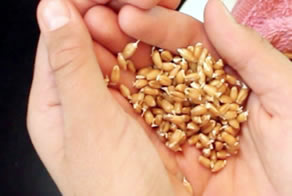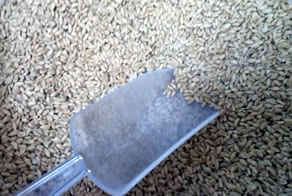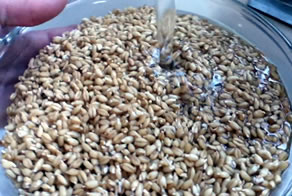
Sprouted Wheat Flour
Great Grain: No Doubt
As part of our efforts to consume better foods for better health, we sprout organic wheat, dry and grind it into flour. This process is easier than you think. The benefits outweigh the small amount of work it takes to make nutritious flour.
A small farmer in Idaho provides our family with non-gmo organic wheat berries in 5-gallon buckets. Some parts of the world may be confused with the use of “berry”. Why someone chose, the term “berry” is somewhat of a mystery. I say “berries” because most of the internet references also uses this term. It refers to the entire wheat kernel (except for the hull), composed of the bran, germ, and endosperm.
There are two primary types of wheat berries: hard and soft. Each type produces different applications: hard wheat for bread and soft for pastries. We use both and apply it in other cooking segments.
Soak it and Bloat it
Our first process in making flour is soaking the berries (hard and soft) for eight hours. This allows them to naturally draw in water and begin to sprout. We use a bowl and water, filled half with berries and water covered beyond the berries level. Nothing too complicated. The berries will expand and bloat within eight hours.
Towel it and Sprout it
After the berries have soaked the eight hours, they are ready for sprouting. We start by rinsing the berries in a colander and use a wet cloth towel as a moisture wrap. We want the berries to sprout for 24 hours. We have found that the longer the stem of the sprout, the sweeter the berry. If  the berry sprouts too long, mold will begin to grow - it varies depending on the climate. Another important need for the sprouting process is heat. The berries will need to set in a warm place, like near the oven or in the warmth of a sunlit window.
the berry sprouts too long, mold will begin to grow - it varies depending on the climate. Another important need for the sprouting process is heat. The berries will need to set in a warm place, like near the oven or in the warmth of a sunlit window.
Complex or Simple
Here is a note on the organic nature of sprouting. We have learned that the sprouting process
transforms the complex carbohydrates to simple carbohydrates. Simply: poly sugars to simple
sugars. Simple sugars digest easier than poly/complex sugars. This is a healthier process. Also, more nutrients are released with sprouting. More is uncovered on this topic with a quick search on the internet.
Eat it or Dry it
After sprouting, we toss the wheat berries in a salad, in a bowl for cereal, eat them raw or dry the berries thoroughly to make flour. To do this, we place the berries on cookie sheets in our oven on a warm setting. We crack the oven open to allow for moister to escape. It takes about eight hours to dry the berries for grinding. During the summer, we use the sun to dry berries. We place them on window screens between bread crates and set them directly in the sun.
In the past, we also made a solar oven after reading the book The Solar Food Dryer This solar oven worked wonderful until our donkey used it as a scratching post. Click here to read about our past solar oven.
Time for making Flour
Grinding wheat berries can be a more rigorous task than the soaking and sprouting. It requires some type of machine to grind the berries. Unless you have a millstone in the back yard, you may have to acquire a flour mill. Since we exclusively only use organic wheat berries, we have worked through a couple of flour mills. Currently we have a combination hand or pulley driven mill. I have attached a 60 Hz electric motor with a 2” reducing pulley to the mills large pulley. This keeps the RPM’s lower and will not heat the flour to a cooking temperature. If the wheat berries dry or grind beyond 120 degrees F, they begin to lose vitamin and enzyme potency.
 The entire process seems a little daunting, but after a few times, it becomes simple to set the wheat berries in water to soak, allow for sprouting, dry and grind. And you can’t beat the nutritional value. According to Weston Price, in his Nutritional and Physical Degeneration, after only 72 hours of grinding flour, it begins to loose nutrients.
The entire process seems a little daunting, but after a few times, it becomes simple to set the wheat berries in water to soak, allow for sprouting, dry and grind. And you can’t beat the nutritional value. According to Weston Price, in his Nutritional and Physical Degeneration, after only 72 hours of grinding flour, it begins to loose nutrients.
Happy Sprouting!
Gary
December 20, 2012






